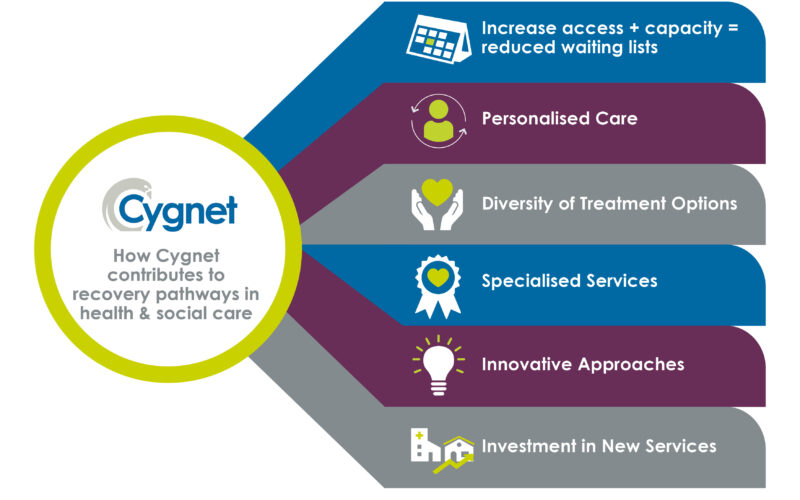The NHS’s 10-Year Health Plan aims for three fundamental shifts:
- From hospital to community: More care will be delivered closer to people’s homes, including through Neighbourhood Health Centres and increased focus on primary and community services.
- From analogue to digital: Leveraging new technology to improve efficiency, accessibility, and patient empowerment through digital health records, online consultations, and AI tools.
- From sickness to prevention: Shifting focus towards earlier intervention, preventing illness, and promoting healthier lifestyles.
Cygnet partners with the NHS and local authorities across the UK to provide mental health and social care services. We offer comprehensive care pathways, from inpatient and specialist care for crisis or complex conditions, to community-based social care.
Through our network of inpatient and community settings around the UK, Cygnet works together with NHS trusts, ICBs, local authorities and voluntary services to serve local populations, providing care as close to home as possible.
We offer a range of specialist services to support complex trauma, neuropsychiatry, forensic services, eating disorders and CAMHS, as well as acute and crisis care. Our social care services provide homes across the UK for people who are able to enjoy fulfilling lives according to their own individual needs and personalised care plans.

How we can support each shift in the NHS Ten Year Health Plan
-
From Hospital to Community:
-
- Reducing pressure on NHS acute beds: Cygnet provides a substantial number of mental health beds across various specialisms including secure, PICU, acute, rehabilitation, eating disorders, neuropsychiatric, learning disabilities, CAMHS, autism, supported living and older persons care. By offering these services, we can help manage demand on NHS inpatient facilities.
- Facilitating step-down care: Cygnet’s rehabilitation and recovery services, supported living, and neuropsychiatric units can provide crucial step-down care from more acute NHS settings, enabling individuals to transition back into the community with appropriate support. This reduces lengths of stay in NHS hospitals and promotes recovery in less restrictive environments.
- Localised provision: With numerous sites across the UK, Cygnet can provide care closer to patients’ homes, aligning with the “Neighbourhood Health Service” concept. This can reduce travel burdens for service users and their families and foster better integration with local community services.
- Specialist services in the community: Cygnet’s expertise in areas like personality disorders, eating disorders, neuropsychiatry, learning disabilities, and autism allows them to offer highly specialised care that might otherwise require prolonged hospital stays or be less readily available in general community settings.
-
From Analogue to Digital:
-
- Adoption of digital health records: As the scope of digital develops in the NHS, Cygnet can ensure its systems are interoperable with NHS digital platforms, allowing for seamless sharing of patient information and contributing to a unified digital health record.
- Utilising technology for efficiency: Cygnet can leverage digital solutions to streamline administrative processes, freeing up clinical staff time, and exploring the use of AI tools for areas like triage or outcome tracking, where appropriate and ethical.
-
From Sickness to Prevention:
-
- Early intervention and crisis support: Cygnet’s urgent admission beds and acute mental health services can play a role in early intervention during mental health crises, potentially preventing escalation to more severe illness and prolonged hospital stays.
- Rehabilitation and recovery focus: By providing comprehensive rehabilitation and recovery pathways, Cygnet aims to help individuals develop life skills, manage their conditions, and progress towards greater independence. This indirectly contributes to prevention by reducing the likelihood of relapse or re-admission.
- Promoting well-being and reducing health inequalities: Cygnet services contribute to improving mental health outcomes, which is a crucial aspect of overall wellbeing and can help address health inequalities. Our work with diverse patient groups, including those with learning disabilities and autism, addresses specific needs that, if unmet, can lead to poorer long-term health.
- Partnerships for holistic care: By working collaboratively with NHS trusts, local authorities, and third-sector organisations, Cygnet can contribute to a more integrated approach to care that supports prevention and addresses the wider determinants of health.
Cygnet demonstrates consistent high-quality care, robust governance, and a commitment to patient safety across our services. We are proud to be integrated partners in recovery pathways that begin in the community, provide step-down support, and enable people back to look forward to fulfilling lives in the community.